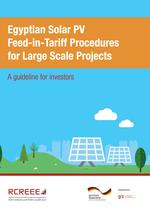Difference between revisions of "Egyptian Solar PV Feed-in-Tariff Procedures for Large Scale Projects"
***** (***** | *****) m |
***** (***** | *****) m |
||
| (One intermediate revision by the same user not shown) | |||
| Line 29: | Line 29: | ||
#Commissioning and Commercial operation | #Commissioning and Commercial operation | ||
#Decommissioning | #Decommissioning | ||
| − | |||
| − | |||
| − | |||
| − | |||
| − | |||
| − | |||
| − | |||
| − | |||
= Reference = | = Reference = | ||
Latest revision as of 14:07, 1 September 2017
|
Title: Egyptian solar PV feed-in-tariff procedures for large scale projects Published by: Deutsche Gesellschaft für Internationale Zusammenarbeit (GIZ) GmbH and Regional Center for Renewable Energy and Energy Efficiency (RCREEE) Sector: Renewable Energy and Energy Efficiency in the MENA region Download link: Egyptian Solar PV Feed-in-Tariff Procedures for Large Scale Projects |
Summary
This guide is intended to provide the most up to date information for investors on the currently proposed solar PV feed-in tariff process for projects more than 500 kWp in nominal capacity and includes detail steps about each of the following processes:
- Developer qualification
- Establishing a Special Purpose Vehicle
- Land securing
- Temporary generation license acquisition
- Cost sharing agreement
- Measurements and studies
- Contracts and agreements
- Permanent generation license acquisition
- Construction and connections
- Commissioning and Commercial operation
- Decommissioning
Reference
|
This article is part of the RE-ACTIVATE project. RE-ACTIVATE “Promoting Employment through Renewable Energy and Energy Efficiency in the MENA Region” is implemented by the Deutsche Gesellschaft für Internationale Zusammenarbeit (GIZ) GmbH on behalf of the German Ministry for Economic Cooperation and Development (BMZ). |




















